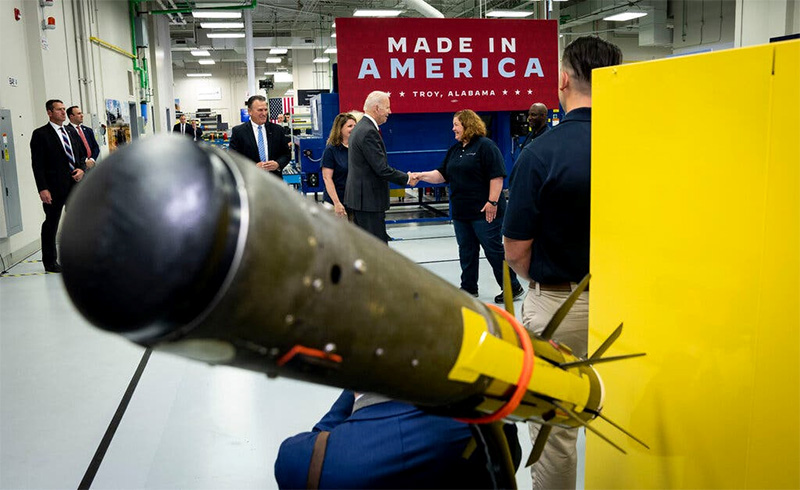
Allies fear US power may be overtaxed as Mideast war spreads. US says it can handle Ukraine, Mideast wars, China tensions, Bloomberg notes.
Joe Biden came to office declaring America is back. Now, facing hot wars in the Middle East and Ukraine and a simmering cold one with China, the US is beginning to look overextended.
In capitals across Europe and Asia, officials are growing worried that some partners might ultimately be shortchanged as the surge in simultaneous challenges strains the US ability to respond and its defense industry struggles to produce enough weapons for all these conflicts. Rivals in Beijing, Moscow and Tehran, they fear, won’t miss the openings that creates.
Adding to the alarm is the presidential election just over a year from now that may return Donald Trump to the White House with his talk of pulling out of alliances, making deals with Russia and openly confronting Iran and China. Already, Biden’s $106 billion budget request for aid to Ukraine, Israel and Taiwan is running into headwinds from Republicans in Congress.
Biden has raced to reassure leaders around the world that the US would be able to confront all the threats at once and deliver on its promises of support.
Privately, however, administration officials concede that the crisis in the Middle East has upended what had been a key tenet of their global approach – that the long-tumultuous region was finally heading into a period where it wouldn’t require such a big US commitment, allowing Washington to focus more on the threat from China. That eastward pivot is likely to be slowed, officials said.
The US had been pulling resources out of the region to send them to confront China and Russia, confident that Israel, having reached historic rapprochements with key Arab countries, would be able to ensure its security without as big a presence from its main ally, according to a person involved in the discussions. That’s now all in question and the US has pushed Israel to delay its ground offensive against Hamas in the Gaza Strip as it shores up defenses in the region. Israel’s failure to detect the Hamas assault and defend itself once it started has also raised questions about its vaunted military capability, according to US officials.
Administration officials underline there are no plans at the moment to have US troops fight on the ground in the Middle East. But Biden, who even as vice president was known for telling aides in the Situation Room that superpowers don’t bluff, is fully aware of the risks that the American forces may be drawn in if efforts to contain the conflict fail.
Now, with Ukraine’s counteroffensive this year making slow progress against Russia’s defenses and questions in Congress growing about the continued commitment to support Kyiv as the war settles into a standoff, the global message looks less clear. The Kremlin, for its part, is betting that it will be able to outlast the US and its allies.
Already, Moscow seems to be winning the race in artillery shells, which have become a key weapon in the conflict. Ukraine has depleted limited US and allied stocks and efforts to escalate production, especially in Europe, have faced setbacks.
The conflict in Ukraine has “exposed the fragility” of the US’s defense supply chain, the Army Science Board warned last month, saying that the US is “struggling to ramp up the production of munitions.”
Now, Israel is also seeking some of the same kinds of shells Ukraine needs for its war against Hamas. Taiwan, at the same time, has ordered some of the same air-defense weapons that both Israel and Ukraine use.
“Our industrial base was not prepared to have to restock so many different types of weapons for multiple different partners at the same time,” said Michèle Flournoy, a former undersecretary of Defense for policy.
With military spending at the lowest level as a share of the economy in more than two decades, the defense industry isn’t ready for a sudden buildup. There are now only five so-called prime contractors, the top of the defense food chain. In 1993, just after the end of the Cold War, there were 51.
Even if the stars were to align in Washington for a major boost in expenditures on defense, US government finances are already under intense pressure with borrowing costs rising.
“The US risks overreaching at a dangerously complicated and uncertain time in the world during a time when we see historic American dysfunction, incompetence and division in our ability to govern,” said former Secretary of Defense Chuck Hagel.
 President Biden greeted employees at a Lockheed Martin facility that manufactures weapon systems, including Javelin antitank missiles
President Biden greeted employees at a Lockheed Martin facility that manufactures weapon systems, including Javelin antitank missiles
Photo: The New York Times
Billions in Ukraine defense spending has been slow to translate into U.S. jobs, notes NBCNews.
Billions of dollars being spent by the federal government to arm Ukraine and replenish U.S. military stockpiles have been slow to translate into a significant number of new jobs in the U.S. as defense manufacturers grapple with logistical challenges in ramping up production.
Weapons manufacturers and Defense Department officials declined to say how many workers have been hired to help meet the increased demand, but comments by company executives and corporate filings indicate that the number of jobs has been relatively small compared to the overall size of the industry despite the flood of federal dollars.
defense companies say they have been struggling to hire workers in a tight labor market, untangle supply chain snarls and restart mothballed production lines. While there are starting to be signs of progress, it could be several more years before production peaks and the billions of dollars earmarked for the war in Ukraine begins to impact the wider economy, industry analysts said.
The U.S. has committed about $44 billion in direct security assistance for the war in Ukraine, the majority going to replenish U.S. stockpiles of ammunition, weapons and other equipment sent to the frontlines. President Joe Biden said last week he is seeking an additional $61.4 billion in aid for Ukraine and $14.3 billion for Israel.
Some Congressional Republicans have been fighting to prevent further spending on Ukraine, threatening to shut down the government to block additional assistance. In his pitch to voters last week for the money, Biden argued that it would provide a benefit at home as well as abroad.
“When we use the money allocated by Congress, we use it to replenish our own stores, our own stockpiles with new equipment, equipment that defends America and is made in America,” Biden said in the televised address from the Oval Office. “Patriot missiles for air defense batteries made in Arizona, artillery shells manufactured in 12 states across the country in Pennsylvania, Ohio, Texas, and so much more.”
But expanding production in those places is taking time. Some companies are having to restart manufacturing of weapons they haven’t made in years, requiring them to rehire workers and reassemble manufacturing lines. Others said they have struggled to find workers, particularly those who are able to get security clearances or willing to move to more remote areas where weapons production typically takes place.
RTX Corp., formerly known as Raytheon, has said that supply chain disruptions and difficulty hiring engineers, skilled laborers and security clearance holders along with high turnover and rising wages have hindered its ability to meet demand for its weapons, like those being used in the war in Ukraine.
“We have had difficulties procuring necessary materials, including raw materials, components, and other supplies, and services on a timely basis or at all. We have also had difficulties hiring qualified personnel, particularly personnel with specialized engineering experience and security clearances,” the company said in its earnings report released Oct. 24. “The timing as to when our supply chain and labor challenges will abate is uncertain and subject to a wide range of factors and future developments.”
“Increasing capacity is going to be difficult, and it’s going to take attention from the top over the long term to get it going,” said Cook. “Defense contractors are typically awarded contracts at a low cost basis so the most efficient contractor typically wins. That means there’s not a lot of manufacturing slack in the system, and that makes it challenging to grow.”
Raytheon CEO Greg Hayes told investors on its earnings call this week that it has been awarded $3 billion of orders related to replenishing U.S. stockpiles with equipment sent to Ukraine and it expects another $4 billion of orders in the next two years. But it will be 24 to 36 months before those contracts are delivered on.
Lockheed Martin said it has seen increased demand from the war in Ukraine for its products, including Javelin anti-tank missiles and High Mobility Artillery Rocket System launchers. But the company said the impact on its business will be felt over years, rather than months, and it doesn’t anticipate a significant increase in its 2023 sales given the “long-cycle nature of our business and current industry capacity.”
read more in our Telegram-channel https://t.me/The_International_Affairs

 11:49 31.10.2023 •
11:49 31.10.2023 •






















